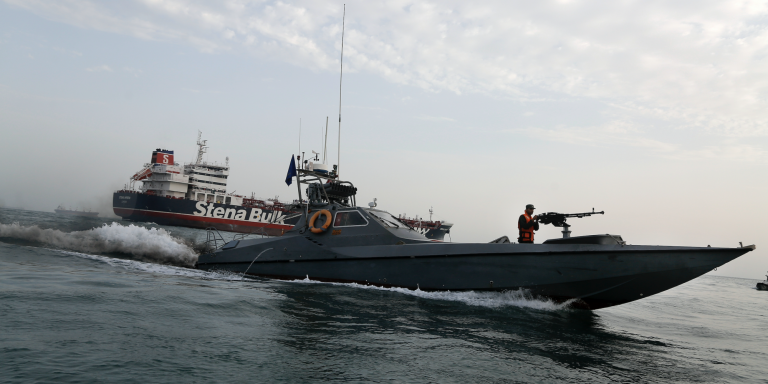INTELBRIEF
August 8, 2019
IntelBrief: Military and Political Dynamics in the Gulf

- The Persian Gulf remains a potential flashpoint as the United States and its allies increase their deployments and Iran strengthens its defense posture.
- Iran’s seizure of another Gulf oil tanker in early August demonstrates Tehran’s confidence in its strategic position throughout the region.
- The muted U.S. reaction to Iran’s latest tanker seizure affirms that the Trump administration seeks to avoid armed conflict with Iran.
- The Gulf states are starting to accommodate Iran’s interests amid increasing uncertainty related to the Trump administration’s intentions.
.
In early August, Iran seized another oil tanker in the Persian Gulf, on this occasion an Iraqi tanker that Iran said was caught 'smuggling' Iranian oil to the 'Arab states.' Since U.S.-Iran tensions escalated in May, as the Trump administration ramped up sanctions, Iran has seized three oil tankers, including one owned by the United Kingdom, and allegedly attacked another six tankers. The United States and Iran also downed one of each other's unmanned aerial vehicles. None of the attacks has led to a loss of life, but the pattern of actions indicates that any future incident could easily escalate into significant armed conflict.
In an attempt to deter Iran's attacks in the Gulf, the United States has continued to build up forces there. Starting with the acceleration of a U.S. aircraft carrier group in May, the United States has announced deployments of additional combat aircraft and missile defense units to the Gulf, as well as the return of U.S. military personnel to the Prince Sultan Air Base in Saudi Arabia that the United States has not used since the 2003 war to overthrow Saddam Hussein. The U.K., which had a tanker, the Steno Impero, seized on July 19 in retaliation for the earlier seizure by British Overseas Territory Gibraltar of an Iranian tanker en route to Syria, has sent two warships to the Gulf to protect British ships. On August 5, the U.K. announced it would join a U.S.-led operation to monitor and help protect shipping in the Gulf. However, the U.S. effort to recruit additional coalition members has run into opposition from countries who do not want to adopt the Trump administration's campaign of maximum pressure on Iran. Germany, for example, has outright refused to join any Gulf protection mission.
The difficulty in recruiting allies to the protection mission, when added to the Trump administration's reticence to retaliate for Iran's provocations, has given Tehran— as well as other states in the region—the clear impression that the United States and its allies are taking every step possible to avoid war with Iran. That impression was fostered by President Trump's aborted retaliation for Iran's downing of a U.S. unmanned aerial surveillance aircraft in June. Iranian leaders read the U.S. and U.S.-allied hesitance to react militarily to Iran's provocations as affirmation of Iran's strong regional position, including its successful intervention on behalf of Bashar Al Assad in Syria, the political and military strength of key Iranian allies Lebanese Hezbollah and Shia militias in Iraq, and the Zaidi Shia Houthi movement in Yemen. Iranian leaders calculate that, because a U.S.-Iran clash could easily cascade throughout the region, war with Iran would undermine President Trump's repeated pledges to extricate the United States from the long conflicts in the region and complicate his drive for re-election in 2020.
The Trump administration's caution in incorporating military action into its policy of maximum pressure on Iran has caused the Gulf states to recalibrate their posture. In July, the UAE, one of the hardline Gulf states on Iran, announced a pullout of its ground troops from Yemen. Those troops were the backbone of the Saudi-led coalition's operations against the Houthis, and the pullout cast doubt upon Riyadh's ability to sustain that war effort. On July 31, the UAE sent a security delegation to Tehran for the first high-level bilateral talks between the two countries since 2013. The visit, coming on the heels of the hesitancy of the UAE to blame Tehran directly for the recent attacks on commercial shipping, suggested that Abu Dhabi may be seeking to de-escalate tensions. There are indications that Saudi Arabia might undertake talks with Iran as well. Both Gulf states have apparently concluded that their agitations against Iran over the past several years risks leaving them to face conflict with the Islamic Republic without direct U.S. military support. The Gulf states appear to have concluded that easing Tehran's unrest over the U.S. maximum pressure campaign is preferable to a war that could destroy much of the infrastructure investments the Gulf states have made in recent decades. The policy adjustment by the Gulf states highlights the lack of international support for the Trump administration's maximum pressure campaign against Iran, although there are no indications, to date, that the administration plans to alter that course.
.
For tailored research and analysis, please contact: info@thesoufancenter.org